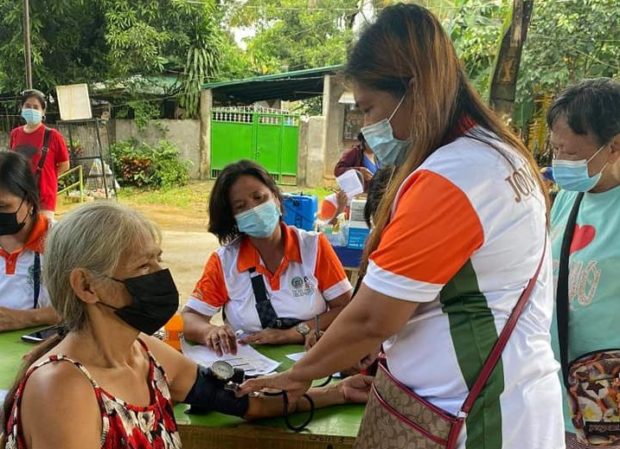‘Plus One’ will let seniors, those with comorbidities bring companion for vaccination

A health worker in Zambales prepares to inoculate a senior citizen against COVID-19. (Photo courtesy of Subic Municipal Health Office)
MANILA, Philippines — The Department of Health (DOH) will soon adopt a “Plus One” policy for vaccination that will allow senior citizens and those with comorbidities to bring a companion who can also receive a shot when they show up for their jab appointment.
The companion of senior citizens (under the A2 priority group) and those with comorbidities (A3) need not be part of any priority group. It is still unclear if the intended Plus One recipient needs to preregister for the shot.
The policy, expected to be signed this week for a nationwide implementation, is a new government incentive to get more people in the A2 and A3 categories inoculated.
“To encourage our elderly to get vaccinated, the national government will allow them to bring a helper, a relative or any other person from their household to bring them to vaccination sites,” the DOH spokesperson , Undersecretary Maria Rosario Vergeire, said in an online town hall session with members of the DOH All Experts Groups on Covid-19 Vaccines on Wednesday.
But while all A2 seniors will be allowed one companion, only individuals with specific comorbidities under A3 will be allowed to bring their Plus One, Vergeire explained.
“Those A3 who will be allowed to bring a Plus One are those who are immunocompromised, such that they will have a hard time going to the vaccination site on their own,” she said.
These include people with cancer, those undergoing chemotherapy or radiation, and transplant patients, among others.
The World Health Organization earlier expressed concern that the Philippines had been slow in vaccinating the elderly who are most at risk of contracting COVID-19, especially with the spread of the more contagious Delta variant of the coronavirus.
Dr. Rabindra Abeyasinghe, the WHO representative to the Philippines, said in late July that only about 2.1 million, or 25 percent of seniors, registered by the local governments had been fully vaccinated, while 35 percent had received their first doses.
As of Sunday, some 12.7 million Filipinos have been fully vaccinated against the virus, while 15.5 million have gotten their first dose.
Recommended mask
The rising number of COVID-19 cases in the Philippines has also prompted the DOH to recommend the use of surgical masks instead of cloth masks.
In the town hall meeting, Vergeire said surgical masks offer better protection against the virus since they can filter organisms in the air.
“Our recommendation for now is if you can afford to wear a surgical mask, especially in areas where there are a high number of cases, then please do so,” Vergeire said.
However, if an individual cannot afford them, a cloth mask still offers some protection, Vergeire said.
“If the community can’t afford it, cloth masks are still okay, we are not saying don’t use them at all,” she said.
Make it double
Dr. Anna Ong-Lim of the DOH technical advisory group said wearing two cloth masks can also offer more protection than just one, if surgical masks are unavailable.
In the same forum, Nina Castillo-Carandang, member of the vaccine experts panel, reminded the public that if they wear cloth masks, these need to be regularly washed and properly dried.
The DOH recommendation was based on an interim recommendation from the WHO that encourages the use of surgical masks in “high-risk settings,” particularly in areas where there is a rise in cases, or where more transmissible variants have been detected.
The DOH earlier said the Delta variant, considered up to 60 times more transmissible, had been detected in all local government units in the National Capital Region (NCR).
11,000 new infections
On Wednesday, the DOH said it recorded 11,085 new COVID-19 cases, bringing the country’s total case count up to 1,776,495.
Thursday is the eighth straight day that over 10,000 new cases were reported in a single day.
The DOH said the “relatively low” number of new cases can be attributed to lower laboratory output on Mondays.
The positivity rate in the country remains high, however, with 23.4 percent of the 46,644 individuals tested on Monday returning a positive result.
The DOH said there remain 105,151 active cases or currently sick individuals while 11,628 individuals have recovered from the respiratory illness, bringing the total number of survivors up to 1,640,721.
However, another 161 have also succumbed to the disease, pushing the death toll up to 30,623.